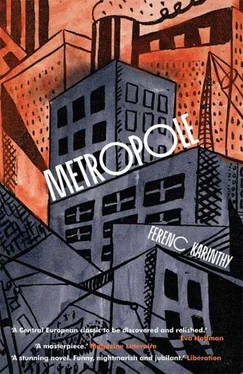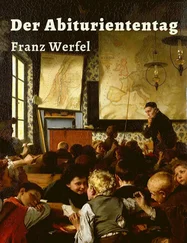So he tried further on at the desk with its variously labelled counters but had no more luck here since the women who worked behind the counters could not understand him and refused even to listen to him, quickly turning away. Next he returned to reception and, having waited in the queue once more, the wait exhausting for both his body and his nervous system, he tried to communicate the fact that if he was no longer desired as a customer they should at least return his belongings to him so that he might seek somewhere else. And his passport too, naturally, since without it, no one else would accommodate him. To his surprise the desk-clerk seemed to realise something for he asked for the slip of paper and took out a fat dossier. He searched in it, then waved two stapled documents, put them down in front of him and addressed him like a teacher, as if to say he had already explained that.
‘ Tuluplubru klött apalapa gróz paratléba… Klött, klött, klött…! ’
Listening to this Budai could make out the expression klött, which he had earlier established to be a mode of address. And gróz , if he was not mistaken, was their word for the number 2… He studied the two sheets of paper. The top one seemed familiar and he quickly came to the conclusion that it was a carbon copy of his last hotel bill, the one he had received last Friday, the one he had not yet settled. Next to it was a similar form with a similar rubric complete with notes, differing only in its bottom-line figure which was a little less than the other one — presumably the bill for this week.
The speech he had just heard must therefore have meant something like: First you must settle the two outstanding bills, yes you, you!… In other words: We are keeping your belongings and passport as surety, you can have them back once you have paid up. That was if he was guessing correctly and the clerk was not saying something altogether different.
Budai did not have enough money, of course, not nearly enough; after all his morning shopping he only had a little change left. He realised that the arranged meeting with Devebe would not take place now. What bothered him most was that she would be knocking at the door of 921, all set for their rendezvous, only to confront the new occupants of the room. What a shock it would be. And there wasn’t even a way of leaving a message for her. This, above all, was unbearable, maddening, agonising. The blood rushed to his head: it was like a cloud hovering over him. The storm was inside him. He wanted to hit out, to break things, to murder someone. He no longer cared about anything. Quite beside himself now, he stamped and groaned and screamed in his mother tongue: no matter if no one else understood him, he could not contain his despair.
‘Scandalous!… Absolutely scandalous! Crooks and bastards the lot of you… filthy swine, bastards!’
He was making a proper scene, causing an affray. A curious crowd gathered round and surrounded him. Then the fat doorman in fur collar, gold braid and peaked cap appeared — he must have been called over — grabbed him by the arm and started dragging him through the throng in the lobby, determined to throw him out. Budai was not yet in control of himself, his whole body was shaking, quite incapable of resistance. When they reached the door the doorman opened it and indicated that he should scram. When Budai did not move he gave him a rough shove and might even have kicked him on the backside. In any case Budai found himself out in the street.
Feeling dizzy, he swayed all over the pavement without knowing what he was doing and it was a good while before he thought to pull himself together. His hat had rolled away but he found it. His coat was open. He had lost two buttons and the shoulder was frayed. He hadn’t the least idea what to do. He drifted with the flow of the crowd and eventually found himself by the ice-rink he had discovered that afternoon. It was dusk already, the streetlamps were coming on, the skaters were weaving circles in the harsh light to equally harsh music. Later he arrived at the skyscraper in construction and felt obliged to count the floors again. There were seventy-five now, three more than before.
Filth and mess everywhere — had it been like this from the beginning or had he simply not noticed? When the wind blew, as it was doing now, it lifted and carried the discarded wrappers and other rubbish with it; a newsstand was caught in the gust, a thousand newspapers were swirling about his feet. He noticed how many old people there seemed to be in town: lame, crippled, halt and half-paralysed, they stumbled, lurched and staggered on sticks through the crowd that pressed against them and separated them. Waves of alien humanity regularly washed over them. Frail old grannies, sickly frightened little sparrows, struggled against the overwhelming crowd, dragging their helpless bodies along, trying to cross at traffic lights, trying to board and squeeze themselves on to buses, constantly being shoved aside, squashed and trodden on in the mêlée. What power maintained them? What strength enabled them to go on living here? Why did they not move into the outer suburbs, into a more amenable environment, to some estate? Then there were the crazies, those who wriggled and babbled, who talked and muttered to themselves, the furious who screamed and roamed the streets uttering terrible cries, madmen who rushed about with knives threatening people who cleared a way for them. Then the mumbling beggars thrusting tins in front of passers-by, the moaning, the insane, the paralysed, the skeletal, the subnormal crawling on all fours — all of them full of the desire to live, all pressed together, each of them brushing past another, covering every inch of pavement like a flood, blocking the traffic, their myriad lives impatient to possess and mob the world.
It occurred to Budai that he might have been evicted on account of Bebe! That it wasn’t the unpaid bill, no, that was a misunderstanding, it was their relationship that had been discovered, the fact that the woman had been with him. And this puritan attitude would not have been based on any formally ethical or religious code or because relations between guest and staff were forbidden. There must be a deeper reason, namely that sexual contact might result in a child, a new being, thereby adding to the already overcrowded population. Maybe that is what they were accusing him of! It might be one of the most serious crimes against society: the wilful exacerbation of a demographic crisis.
It was growing darker: there were lights in the sky, white, red, lilac and green. Some glowed steadily, other spun or alternated or swayed or sparkled; some seemed to swim slowly away, others to appear suddenly out of the darkness only to disappear again as mysteriously. What were they? Stars? Aircraft? Signals on towers or on tops of skyscrapers to prevent aircraft crashing into them? Were they rockets? Spaceships? But he didn’t feel like speculating about such things now, it was his appointment in the evening that mattered most, for the hour was approaching when he was due to meet Petebe. He hurried back to the hotel.
But the doorman who had till now greeted him so courteously, opening the swing door for him, now stood in front of him as soon as he saw him, his fat, wide body blocking the way. He wasn’t a mere dummy after all it seemed, nor a robot as Budai had earlier suspected: the man recognised him, remembered his face and the incident that afternoon. And he stood before him now utterly immobile, with as expressionless a face as before, his stupid little eyes blinking. This time though his arm was raised in rejection instead of invitation.
Budai did not go away but merely moved a little to the side. Where should he have gone after all? However humiliating the behaviour of this ridiculous lump of lard might be, there was no choice for him, no other option but to try his luck here. His plan was to wait for an opportunity to sneak in when a larger group arrived and the doorman would salute them with a touch of his peaked cap. Budai carefully sauntered up to one such and joined it as though he were of the company. But the doorman was alert to that: he let everyone through but when Budai tried to enter he quickly stepped forward and blocked him with his enormous belly. It was no use: however he schemed and plotted the doorman was too alert. At his third or fourth attempt Budai went at it with such determination that the pair of them came right up against each other and were struggling in the doorway, each trying to shove the other out of the way. Budai was no weakling and thought he could handle a mound of blubber like the doorman but the latter proved to have much more stamina than he thought, and in any case he had propped himself against the doorframe which gave him an advantage. In the end they reached a stalemate and the two of them stood there, back to square one, neither of them having gained an inch. This effectively meant defeat for Budai since it was he who had wanted to advance. Now he had to retreat.
Читать дальше












